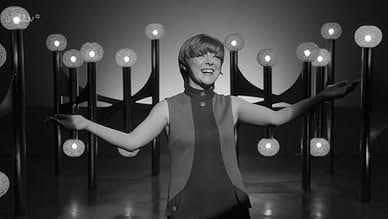Cilla
- TV Mini Series
- 2014
- 46m
IMDb RATING
7.8/10
1.7K
YOUR RATING
The life and career of British singer and entertainer Cilla Black.The life and career of British singer and entertainer Cilla Black.The life and career of British singer and entertainer Cilla Black.
- Nominated for 3 BAFTA Awards
- 4 wins & 14 nominations total
Browse episodes
Featured reviews
The story telling was true to life. Sheridan Smith sang the songs brilliantly, the acting was great and it was a true depiction of life in the 1960's. I was disappointed when the series ended. But I get that it was about her singing career, rather than her subsequent TV host career. Very sensitively done.
Cilla Black is revered in England and no wonder. Working class girl befriends The Beatles before they were The Beatles, gets up to sing at Liverpool's Cavern Club, and improbably goes on to international fame. The locations are lush, with lots of gritty brick urban streetscapes and great 1960s fashion. But it's subtle and not overdone. And The Beatles are portrayed, but in a nicely casual way. The music is great -- it comes across as live; it's not over-produced. The lead actors are great. The woman playing Cilla is quite suited to the role -- the girl next door but confident and sassy. But her voice isn't as good as the real Cilla Black -- it's a little too low and Smith sometimes belts put those songs rather than sings them. As her boyfriend Bobby Willis, Aneurin Barnard is great -- the character is initially a bit flaky, but turns out to be a solid support to her. The story hums along at a steady pace. The dialogue is a bit clunky at times, and the Liverpool accents can be hard to understand. The third and final episode is the weakest. Black may have had too much input into the script because Cilla and Bobby barely kiss, and keep chaste separate hotel rooms. If it's true Cilla vetoed Bobby recording songs because she wanted him to look after her, it's a bit disturbing. The series ends rather abruptly but I suppose the 1960s 'star is born' phase had ended, and that was the point of the show. Overall, a good effort.
I was at school in the 1950's and 1960's and yes I also noticed a number of inaccuracies, but this was not the point of the programme. There are plenty of historical books and websites out there if that is what you want. The programme is all about capturing the hopes and dreams of young musicians during a very exciting period in popular music, and this it does perfectly. Any references to the Beatles are in the context of the story itself and are not intended to be an detailed account of their movements. If any of the inaccuracies had detracted from the storyline then I am sure that Cilla herself would have objected to it. So just sit back and enjoy the programme and avoid any unnecessary nitpicking.
One reviewer wrote about Cilla's Protestant family. Wasn't she raised Roman Catholic? I believe she attended St. Anthony's School. I would appreciate clarification on this. The DVD is non USA formatted, so it cannot be played o most players in the U.S. at this time - Hopefully the series will appear on The BBC in America channel some time in the very near future. Also, I find it strange that no further installments detailing Cilla's further career are planned in view of the rave reviews for the series. Thanks for all of the reviews for this series, as I've found all of them informative and well- written. One of the reasons I am looking forward to seeing this series is that I've read about twelve reviews and all are positive ones.
On the face of it the life of Cilla Black (née Priscilla White) might seem an unprepossessing subject for a biopic. After a brief period as a singing star in the mid-1960s, she gradually moved into more middle-of-the-road activities such as hosting her own television Show CILLA, acting in pantomime and subsequently becoming the host of BLIND DATE and SURPRISE SURPRISE. Her chief claim to fame in her early years seems to be her association with The Beatles at the beginning of their careers.
Nonetheless Paul Whittington's drama proves compelling viewing. This is chiefly due to a series of stellar performances - although Sheridan Smith bears little facial resemblance to the character she lays, she communicates Black's verbal and gestural nuances perfectly, that combination of sheer drive and homespun charm that helped Black to remain at the top of her profession for thirty-plus years. Smith also has a wonderful singing voice: at the end of each of the three parts, we are told that she sang everything live. This is quite the best characterization I have seen from this talented actress.
Smith is admirably complimented by Aneurin Barnard as her road manager (and later her husband) Bobby Willis. Initially he comes across as a bit of a lad, someone who willingly lies about his age and profession in order to pursue the girl of his dreams. As time passes, however, so he understands the depth of his attraction to Cilla; he even passes up the chance of a stellar career of his own in order to be with her. The love-scenes between the two are really touching, as we understand how they were simply made for one another. Especially in her early career, Cilla could not record without seeing Bobby out of the corner of her eye.
As Brian Epstein, Ed Stoppard has a difficult role to play as a stellar manager with a complicated - not to say disastrous - private life at a time when homosexuality was still a crime. We understand a lot about his contradictions; his brilliant flair for publicity and/or finding the right people to further Cilla's burgeoning career, allied to his desperate need for love, something that he can never find. Epstein was the rock upon which Cilla constructed her career - although never in love with him, she found she could seldom do without him. In a poignant sequence set in a hotel restaurant, she learns of his premature death through an overdose of sleeping-pills, and collapses into Bobby's arms.
Stylistically speaking CILLA's narrative comprises a series of intimate sequences that convincingly recreate the atmosphere of early Sixties Liverpool and London Director Whittington is also fond of the aerial shot that gives a panorama of the industrial landscapes in which Black grew up. While certain aspects of her life have been omitted - notably her stint as a server in a restaurant - Jeff Pope's script vividly recaptures her social background in which religion and morality played such a significant part. This three-part biopic is definitely worth watching, not only for its entertainment value but for its evocation of a long-vanished world of working-class life.
Nonetheless Paul Whittington's drama proves compelling viewing. This is chiefly due to a series of stellar performances - although Sheridan Smith bears little facial resemblance to the character she lays, she communicates Black's verbal and gestural nuances perfectly, that combination of sheer drive and homespun charm that helped Black to remain at the top of her profession for thirty-plus years. Smith also has a wonderful singing voice: at the end of each of the three parts, we are told that she sang everything live. This is quite the best characterization I have seen from this talented actress.
Smith is admirably complimented by Aneurin Barnard as her road manager (and later her husband) Bobby Willis. Initially he comes across as a bit of a lad, someone who willingly lies about his age and profession in order to pursue the girl of his dreams. As time passes, however, so he understands the depth of his attraction to Cilla; he even passes up the chance of a stellar career of his own in order to be with her. The love-scenes between the two are really touching, as we understand how they were simply made for one another. Especially in her early career, Cilla could not record without seeing Bobby out of the corner of her eye.
As Brian Epstein, Ed Stoppard has a difficult role to play as a stellar manager with a complicated - not to say disastrous - private life at a time when homosexuality was still a crime. We understand a lot about his contradictions; his brilliant flair for publicity and/or finding the right people to further Cilla's burgeoning career, allied to his desperate need for love, something that he can never find. Epstein was the rock upon which Cilla constructed her career - although never in love with him, she found she could seldom do without him. In a poignant sequence set in a hotel restaurant, she learns of his premature death through an overdose of sleeping-pills, and collapses into Bobby's arms.
Stylistically speaking CILLA's narrative comprises a series of intimate sequences that convincingly recreate the atmosphere of early Sixties Liverpool and London Director Whittington is also fond of the aerial shot that gives a panorama of the industrial landscapes in which Black grew up. While certain aspects of her life have been omitted - notably her stint as a server in a restaurant - Jeff Pope's script vividly recaptures her social background in which religion and morality played such a significant part. This three-part biopic is definitely worth watching, not only for its entertainment value but for its evocation of a long-vanished world of working-class life.
Did you know
- TriviaAll Cilla's songs were sung by Sheridan Smith.
- GoofsIn the scene of the recording of "Anyone Who Had a Heart," clearly visible on top of the upright piano is a pair of DT100 headphones. These weren't introduced until 1969; the song was recorded in 1963.
- ConnectionsEdited into Some Other Guys: The Story of the Big Three (2017)
- How many seasons does Cilla have?Powered by Alexa
Details
- Release date
- Country of origin
- Language
- Also known as
- 女伶希拉
- Filming locations
- Belgrave Pub, Bryanston Road, Aigburth, Liverpool, Merseyside, England, UK(interiors: White family's flat)
- Production company
- See more company credits at IMDbPro
- Runtime
- 46m
- Color
- Aspect ratio
- 1.78 : 1
Contribute to this page
Suggest an edit or add missing content

































